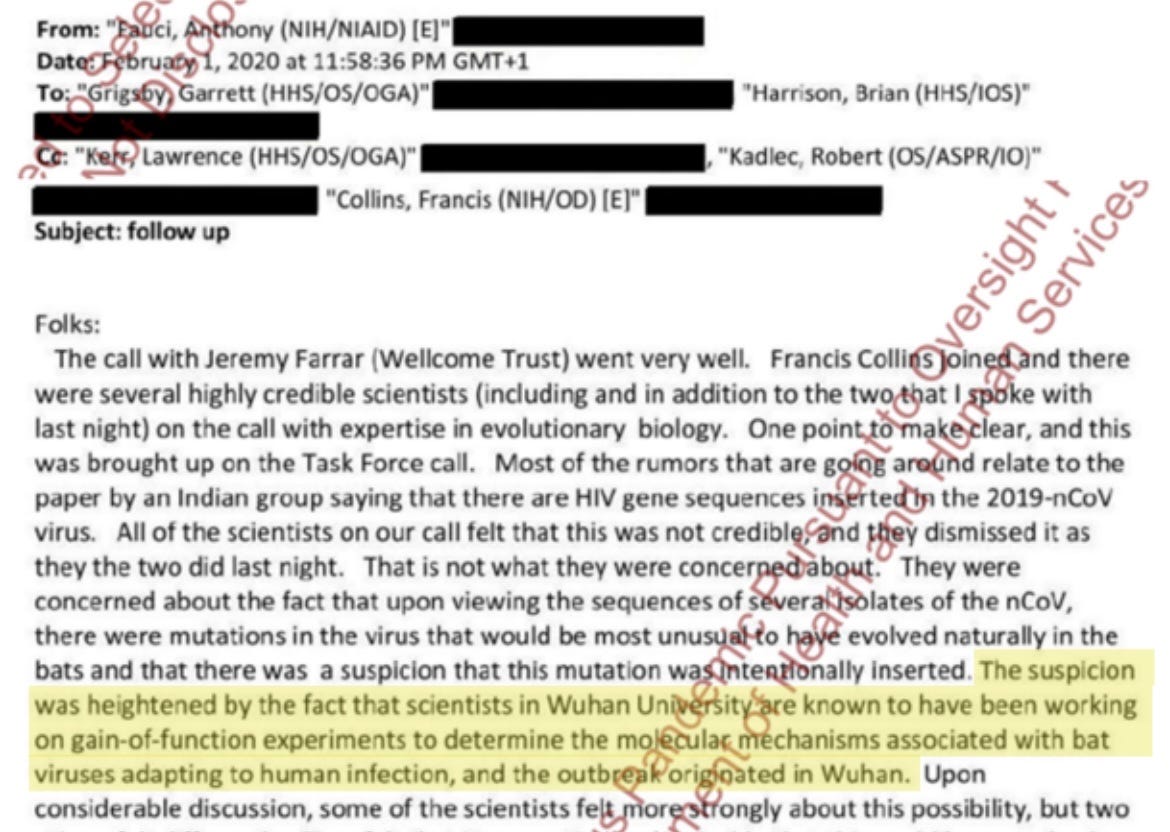Table of Contents
Alex Berenson
Alex Berenson is a former New York Times reporter and the author of 13 novels, three non-fiction books, and the Unreported Truths booklets. His newest book, PANDEMIA, on the coronavirus and our response to it, was published in November 2021.
“Scientists in Wuhan University are known to have been working on gain-of-function experiments.”
The words – from Feb. 1, 2020, as Covid exploded worldwide – come from a note written by none other than Dr. Anthony Fauci, America’s Doctor himself. They come as Fauci and top virologists were just starting their strenuous efforts to hide and distract from the potential Chinese lab origins of Sars-Cov-2.
And after the first cover-up came the second. The National Institutes of Health hid Fauci’s words, completely redacting the email he had written from Freedom of Information Act requests. The NIH gave up the note only in response to a House of Representatives subpoena – years after Fauci wrote it, far too late.
Fauci’s email is contained in a devastating new federal report that shows that political factors influenced the search for the origins of the coronavirus even before that search really began.
The House Select Subcommittee on the Coronavirus Pandemic released the report last week. Predictably, the media has largely refused to cover it. The silence is too bad, because the report is cautiously written. It doesn’t make unfounded or overreaching assertions. It doesn’t need to.
Instead, it draws on testimony and records from the virologists at the centre of the debate, using their own words to make a compelling case that they feared stigmatizing China – and possibly damaging their own chances for future research funding – if they acknowledged their private fears.

—
The report also makes clear that three of the world’s most powerful and politically connected scientists were integrally involved with the early “Proximal Origins” paper. That paper did more to shape the debate around Covid’s origins than anything else after it was published in the journal Nature Medicine on March 17, 2020.
Fauci, Dr. Francis Collins, who as the head of the NIH was Fauci’s nominal boss, and Jeremy Farrar, a British infectious disease researcher who is now the chief scientist of the World Health Organization, saw drafts of the paper – though their names did not appear on it.
Then again, the scientists writing the paper hardly needed Fauci, Collins, and Farrar to remind them of the stakes of the fight over the origins of Sars-Cov-2.
As Andrew Rambaut, one of the scientists who wrote Proximal Origins, wrote to three others on Feb. 2, 2020, they had to consider “the shit show that would happen if anyone serious accused the Chinese of even accidental release.”
In turn, Kristian Andersen, another author, replied that Rambaut’s concerns were “very reasonable.” He added, “I hate when politics is injected into science – but its impossible not to, especially given the circumstances.”
(The suspicion was heightened… When in doubt, use the passive voice.)

The report also offers two tantalizing hints that intelligence agencies were involved in searching for the origins of the coronavirus from the start.
On Jan. 31, 2020, Andersen told Fauci he was worried that the coronavirus appeared to be oddly well-adapted to infecting humans because of its furin cleavage site, a very unusual feature in a bat coronavirus, Fauci emailed Farrar he planned to “alert my US. Government official colleagues of my conversation with you and Kristian and determine what further investigation they recommend.”
Fauci, always careful about what he put in writing, did not specify whom he meant by “official colleagues.” But he apparently did not mean civilian law enforcement authorities at the Federal Bureau of Investigation, because he refers to them separately in the note.
Ten days later, the four initial authors of the Proximal Origins paper recruited Ian Lipkin, a prominent virologist at Columbia University who was probably best-known for consulting on the movie Contagion, as a fifth.
In discussing Lipkin, Edward Holmes, one of the initial authors, emailed Andersen that “Ian Lipkin just called – very worried about the furin cleavage site and says that high ups are as well, inc. intel.” [emphasis added].
(I’LL BE YOUR INTELLIGENCE AGENCY)
Yet when they released the paper online on Feb. 16 – and published it in Nature Medicine a month later – the authors took a very different path. They flatly ruled out that Sars-CoV-2 could be “a laboratory construct or a purposefully manipulated virus.”
In the paper itself, the authors did not absolutely rule out that the virus could have leaked from a lab. Instead, they gave themselves a slight out by writing that “it is improbable [emphasis added] that SARS-CoV-2 emerged through laboratory manipulation” while offering two more “plausible” scenarios of natural origin.
But as the House report notes, as they talked about the paper afterwards, the scientists essentially erased any distinction between the theory that Chinese researchers had intentionally created the virus and that it had accidentally leaked.
For example, Scripps Research – where Andersen worked – put out a press release about the paper headlined:
The COVID-19 coronavirus epidemic has a natural origin, scientists say
“We can firmly determine that SARS-CoV-2 originated through natural processes,” the release quoted Andersen as saying.
At best, “natural processes” is deliberately deceptive language – referring to the possibility that Chinese researchers in Wuhan put a precursor to SARS-CoV-2 through cell cultures until it picked up a furin cleavage site and other features that made it more dangerous.
Virologists have a name for that kind of work. They call it gain-of-function research.
And as everyone involved with the Proximal Origins paper, including Anthony Fauci, knew all-too-well, researchers in Wuhan had been conducting it for years.
Too bad they didn’t see fit to tell us what they really thought. They have ensnared themselves in a web of deceit that has only grown stickier in the last three years.









